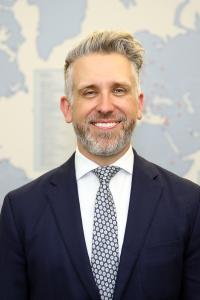Issue: Special Issue 2|2019/2019
For many, Africa continues to be the embodiment of political crises, technical backwardness, enormous population growth, famines, and wars over raw materials.
Here, resource wealth in particular is both a blessing and a curse. For instance, China has long since discovered the region as a source of new raw materials and attempts to systematically expand its influence. For many authoritarian governments, Chinese pragmatism is an attractive alternative to Western conditionality, as Christoph Plate explains in his article.
Inadequate economic prospects, insufficient political participation, and last but not least a lack of security due to terrorism and local conflicts motivate young Africans in particular to head for Europe. It is only through development cooperation, closely meshed with foreign and security policy, that migration to the European Union can be better regulated in the future, Peter Molt believes. Security can thus be considered an important pillar of Berlin’s Africa policy. In his article, Tinko Weibezahl also highlights the idea of networked security and emphasises that Germany’s military involvement in Mali must address not only security policy concerns, but rule of law issues and societal problems as well.
The economic and social pressure bearing down on many African communities does not necessary result in a rejection of democracy, Simon Primus and Emmanuel Gyimah-Boadi argue. They paint a refreshingly positive picture with regard to the liberal democratic attitudes of African citizens based on the Afrobarometer’s surveys. According to the latter, many of the continent’s citizens are more open to democratic values than is frequently assumed.
Using Kenya as an example, Jan Cernicky and Antonie Hutter show how political liberty can benefit from technical progress. Young people, who dominate in numbers, have a good chance to use the internet to participate in the design of a freer, fairer society, even if free internet does not necessarily lead to more political codetermination in Africa.
Apart from the digital space, urban space and its development also poses a challenge to the continent. Tilmann Feltes takes a close look at Africa’s rapidly growing urban centres. There is a danger that poverty and lack of future prospects will come to the cities, giving rise to new slums and informal settlements. Nevertheless, being centres of political involvement and power, African cities in particular have enormous potential for sustainable solutions in the development of democracy.
Finally, Mathias Kamp sheds light on another challenge for the economic future of the African continent: energy supply. He argues that the necessary African energy shift towards a low-carbon supply can succeed only if renewable energies are used intensively. Even so, the road to that success will be an extremely long one.
We should therefore not expect that the utopian, high-tech Kingdom of Wakanda will become a reality in Africa’s near future. Nevertheless, innovative steps in the direction of technical development and democratisation do give us reason to hope.
I wish you a stimulating read.
Yours,
Dr. Gerhard Wahlers is Editor of International Reports, Deputy Secretary General and Head of the Department European and International Cooperation of the Konrad-Adenauer-Stiftung (gerhard.wahlers@kas.de).



